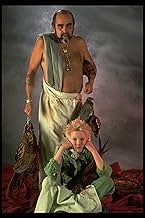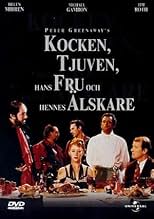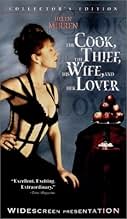At an opulent gourmet restaurant, a woman carries on an affair with deadly consequences.At an opulent gourmet restaurant, a woman carries on an affair with deadly consequences.At an opulent gourmet restaurant, a woman carries on an affair with deadly consequences.
- Awards
- 7 wins & 11 nominations total
Ciarán Hinds
- Cory
- (as Ciaran Hinds)
Roger Ashton-Griffiths
- Turpin
- (as Roger Ashton Griffiths)
- Director
- Writer
- All cast & crew
- Production, box office & more at IMDbPro
Featured reviews
The cruel and sadistic crime boss Albert Spica (Michael Gambon) has dinner every night in his restaurant with his wife Georgina Spica (Helen Mirren) and his gang. Albert abuses of his wife, his gangsters, the chef Richard Borst (Richard Bohringer) and the restaurant employees.
When Georgina meets the gentle bookseller Michael (Alan Howard) in the restaurant, they have a torrid affair in the restroom and in the store, and they are covered by Richard. However the prostitute Pat discloses to Albert that he has been betrayed by Georgina and Albert kills Michael. However Georgina plots revenge against Albert with the support of Richard and the victims of Albert.
"The Cook the Thief His Wife & Her Lover" is one of the most grotesque, eschatological, bizarre and weird films that I have ever seen. But it is also absolutely original and mesmerizing, with intense use of colors, and with the contrast of vulgarity and art. Food, eschatology, sex, cruelty, torture, cannibalism and revenge are entwined along 124 minutes running time. The result is not pleasant and only specific audiences will appreciate this film. Last time I had seen this film was on 08 September 2000 on VHS. My vote is eight.
Title (Brazil): "O Cozinheiro, o Ladrão, Sua Mulher e o Amante" ("The Cook the Thief, His Wife and the Lover")
When Georgina meets the gentle bookseller Michael (Alan Howard) in the restaurant, they have a torrid affair in the restroom and in the store, and they are covered by Richard. However the prostitute Pat discloses to Albert that he has been betrayed by Georgina and Albert kills Michael. However Georgina plots revenge against Albert with the support of Richard and the victims of Albert.
"The Cook the Thief His Wife & Her Lover" is one of the most grotesque, eschatological, bizarre and weird films that I have ever seen. But it is also absolutely original and mesmerizing, with intense use of colors, and with the contrast of vulgarity and art. Food, eschatology, sex, cruelty, torture, cannibalism and revenge are entwined along 124 minutes running time. The result is not pleasant and only specific audiences will appreciate this film. Last time I had seen this film was on 08 September 2000 on VHS. My vote is eight.
Title (Brazil): "O Cozinheiro, o Ladrão, Sua Mulher e o Amante" ("The Cook the Thief, His Wife and the Lover")
First of all, I have to say that this film is one of my personal favorites, and that it is one of those things one must see during his or her lifetime.
Truthfully, however, I first got into this film after hearing clips of the soundtrack on the Japanese version of Iron Chef, during a time before it was acquired by the Food Network. This film score, composed by the great post-minimalist Michael Nyman, is still one of the most haunting and soul-stirring scores in my opinion, if not the one of the most impressionable bodies of musical work ever. I still listen to the album on a weekly basis - it gets under your skin that way.
The film itself is a piece of total art, as others have said. The sets are saturated with their singular color schemes (blue for the restaurant's exterior, green for the kitchen, white for the restrooms, and red for the main dining hall) , and people who have any sort of artistic training have valued and will continue to value this film as a character study of color. In this present age where most films present their interpretations of visual thrill through costly CG and SFX technologies, this film is a testament to how color can be a driving influence behind effective set design and cinematography.
The principal actors, including the always amazing Helen Mirren and Michael Gambon, are first rate. Helen Mirren's Georgina is a truly heart-wrenching character, especially in the face of Gambon's portrayal of Albert Spica, a poor excuse for a human being and one of cinema's cruelest villains. The cook and lover are merely catalysts, serving to instigate the final act that is the undoing of Albert's overreaching tyranny.
I suppose the anti-Thatcher sentiment is highly applicable to this film, but since I am not a British citizen, I feel that I cannot comment on this. However, I think the film's allegory can also be applied to other scenarios where a brutish figure uses violence and exploitation as a way to control others whose primary fault is only residing in the same physical/social/legal domain as the brute.
In short, a masterpiece.
Truthfully, however, I first got into this film after hearing clips of the soundtrack on the Japanese version of Iron Chef, during a time before it was acquired by the Food Network. This film score, composed by the great post-minimalist Michael Nyman, is still one of the most haunting and soul-stirring scores in my opinion, if not the one of the most impressionable bodies of musical work ever. I still listen to the album on a weekly basis - it gets under your skin that way.
The film itself is a piece of total art, as others have said. The sets are saturated with their singular color schemes (blue for the restaurant's exterior, green for the kitchen, white for the restrooms, and red for the main dining hall) , and people who have any sort of artistic training have valued and will continue to value this film as a character study of color. In this present age where most films present their interpretations of visual thrill through costly CG and SFX technologies, this film is a testament to how color can be a driving influence behind effective set design and cinematography.
The principal actors, including the always amazing Helen Mirren and Michael Gambon, are first rate. Helen Mirren's Georgina is a truly heart-wrenching character, especially in the face of Gambon's portrayal of Albert Spica, a poor excuse for a human being and one of cinema's cruelest villains. The cook and lover are merely catalysts, serving to instigate the final act that is the undoing of Albert's overreaching tyranny.
I suppose the anti-Thatcher sentiment is highly applicable to this film, but since I am not a British citizen, I feel that I cannot comment on this. However, I think the film's allegory can also be applied to other scenarios where a brutish figure uses violence and exploitation as a way to control others whose primary fault is only residing in the same physical/social/legal domain as the brute.
In short, a masterpiece.
I sat transfixed by this film's ability to become increasingly depraved, always without any redeeming quality whatsoever. We would have left except that I became fascinated by the ability of the director and writer to hit bottom and then keep drilling. The story is familiar enough but there are no protagonists. There really are no antagonists either. Just a bunch of people you care nothing about doing things you don't want to know about. If a friend did this stuff to another human and wanted to tell you about it, you would scream for him/her to stop.
To top it off it has a score by Michael Nyman who had just enough talent to write one bad film score and retreads it for every film that a producer is stupid enough to hire him to score.
To top it off it has a score by Michael Nyman who had just enough talent to write one bad film score and retreads it for every film that a producer is stupid enough to hire him to score.
Imagine the universe as a restaurant. The parking lot is the world. The kitchen is purgatory. The ladies's room is heaven. The dining room is hell. Hell is ruled over by Albert Spica, (Satan) excellently played by Michael Gobon. Dante is Michael (Alan Howard) a cataloger of French books. Beatrice, Dante's perfect woman, Georgina Spica (Helen Mirren) who is married to the devil.
In the beginning, the cook (God) in the real world is seen kicked and smeared and fed dog feces by Gabon. He is humiliated and in tears, but He endures and eventually helps to further the love between Howard and MIrren. Sex, in its pure form, is looked at as something sacred. Gabon lords over everyone in his realm with a tyrant's fist, caring nothing about anyone or anything. He wants two three things out of lifesuperiority to all other being, food and sex, while Mirren, as a reluctant Persephone, sneaks off to be with Howard. A couple of times Gabon even finds his way into the sanctity of heaven, but this is only short-lived.
The mood of the film is dark-black, heralded by brilliant reds or greens, and the tenor of an angelic child throughout. Every image is like a painting. Emotions creep in from all directions.
This is a film that would never, no matter what year it was produced, have won an Academy Award. It is too refined, to subtle, too sensual, too intelligent.
Watch it, rent it, buy it. It must be seen.
In the beginning, the cook (God) in the real world is seen kicked and smeared and fed dog feces by Gabon. He is humiliated and in tears, but He endures and eventually helps to further the love between Howard and MIrren. Sex, in its pure form, is looked at as something sacred. Gabon lords over everyone in his realm with a tyrant's fist, caring nothing about anyone or anything. He wants two three things out of lifesuperiority to all other being, food and sex, while Mirren, as a reluctant Persephone, sneaks off to be with Howard. A couple of times Gabon even finds his way into the sanctity of heaven, but this is only short-lived.
The mood of the film is dark-black, heralded by brilliant reds or greens, and the tenor of an angelic child throughout. Every image is like a painting. Emotions creep in from all directions.
This is a film that would never, no matter what year it was produced, have won an Academy Award. It is too refined, to subtle, too sensual, too intelligent.
Watch it, rent it, buy it. It must be seen.
10miloc
Here's the weird secret of this movie: you might actually enjoy it.
Peter Greenaway once commented, "film is too important to be left in the hands of story- tellers." Like almost everything Godard ever said, it's a preposterous statement that ought to be heeded.
As a filmmaker Greenaway has always delighted in puzzle-pictures; from the twin-based symmetry of "A Zed and Two Naughts" to the subliminal counting-game of "Drowning by Numbers" to the mad frames-within-frames of "Prospero's Books" his films resemble nothing so much as one of Graeme Base's wonderful children's' books ("The Eleventh Hour" and "Animalia" for instance) brought to life. Plus, of course, a great deal of nudity and assorted nastiness-- enough to get the works of one of the most original filmmakers living a rather sordid reputation.
So, once you've recovered from the visceral shock of watching "The Cook, the Thief, His Wife and Her Lover" the first time, take a step back and watch it again. Yeah, I mean that, do it. Look at it this time as you might a painting by Heironymus Bosch: what appears to be a madman's chaotic hellscape turns out to have a precise allegorical order, and contains such a wealth of symbolism that one viewing cannot possibly be enough to absorb it all. A scene that may seem gratuitously horrific (a naked couple enclosed in a truck full of rotting meat-- probably the moment that jolted me the most) in fact reveals a medievalist's precision (Adam and Eve, cast from Paradise for the First Big Sin, are suddenly subject to the corruption of the flesh). An abstract concept is thus made perfectly and accessibly literal.
Different viewers may prefer to see this movie as religious allegory, political screed, or wry class commentary. The fact is it is all of these, and probably more. The irony of Greenaway's quote above is that he is in fact story-telling on several levels at once. (It's the same irony in the comment that "Seinfeld" was a "show about nothing" when in fact there was more going on per episode than in any other ten sitcoms. It just wasn't "simple.")
In response to criticism over the bloodshed in his movies, Godard once said "It isn't blood, it's red." Meaning: it's all part of a composition, the way color is used on a painter's canvas. It's there for a point, just like Greenaway's explicit yet elegant shocks. With that mind, watch this movie, and enjoy it. It's sharp, gruesomely witty, and as remarkable to look at as almost anything in the Met. If you can handle really thinking, you can handle this, and we all can, can't we?
Peter Greenaway once commented, "film is too important to be left in the hands of story- tellers." Like almost everything Godard ever said, it's a preposterous statement that ought to be heeded.
As a filmmaker Greenaway has always delighted in puzzle-pictures; from the twin-based symmetry of "A Zed and Two Naughts" to the subliminal counting-game of "Drowning by Numbers" to the mad frames-within-frames of "Prospero's Books" his films resemble nothing so much as one of Graeme Base's wonderful children's' books ("The Eleventh Hour" and "Animalia" for instance) brought to life. Plus, of course, a great deal of nudity and assorted nastiness-- enough to get the works of one of the most original filmmakers living a rather sordid reputation.
So, once you've recovered from the visceral shock of watching "The Cook, the Thief, His Wife and Her Lover" the first time, take a step back and watch it again. Yeah, I mean that, do it. Look at it this time as you might a painting by Heironymus Bosch: what appears to be a madman's chaotic hellscape turns out to have a precise allegorical order, and contains such a wealth of symbolism that one viewing cannot possibly be enough to absorb it all. A scene that may seem gratuitously horrific (a naked couple enclosed in a truck full of rotting meat-- probably the moment that jolted me the most) in fact reveals a medievalist's precision (Adam and Eve, cast from Paradise for the First Big Sin, are suddenly subject to the corruption of the flesh). An abstract concept is thus made perfectly and accessibly literal.
Different viewers may prefer to see this movie as religious allegory, political screed, or wry class commentary. The fact is it is all of these, and probably more. The irony of Greenaway's quote above is that he is in fact story-telling on several levels at once. (It's the same irony in the comment that "Seinfeld" was a "show about nothing" when in fact there was more going on per episode than in any other ten sitcoms. It just wasn't "simple.")
In response to criticism over the bloodshed in his movies, Godard once said "It isn't blood, it's red." Meaning: it's all part of a composition, the way color is used on a painter's canvas. It's there for a point, just like Greenaway's explicit yet elegant shocks. With that mind, watch this movie, and enjoy it. It's sharp, gruesomely witty, and as remarkable to look at as almost anything in the Met. If you can handle really thinking, you can handle this, and we all can, can't we?
Did you know
- TriviaThe four title characters were named for the actors and actress writer and director Peter Greenaway originally wanted to play them. Richard (The Cook) was for Richard Bohringer, the only one of Greenaway's original choices retained in the final movie. Albert (The Thief) was named after Albert Finney, while Georgina (His Wife) was for Georgina Hale. Michael (The Lover) was named, interestingly enough, for Sir Michael Gambon, who Greenaway eventually re-cast as Albert.
- GoofsWhen Albert (Michael Gambon) goes into the ladies' toilet and starts throwing women out of the cubicles, the second one has, as you would expect, her underwear around her knees. But her skirt rides right up, revealing that she is still wearing her underwear and that the ones below are a prop.
- Crazy creditsClosing credits epilogue: "And a special thanks to those very many people who patiently & repeatedly performed as patients & nurses in the hospital ward, and as diners in the Hollandais Restaurant."
- Alternate versionsAn edited, R-rated version is available on video.
Details
- Release date
- Countries of origin
- Official site
- Languages
- Also known as
- El cocinero, el ladrón, su esposa y su amante
- Filming locations
- Production companies
- See more company credits at IMDbPro
Box office
- Gross US & Canada
- $7,724,701
- Opening weekend US & Canada
- $252,223
- Apr 8, 1990
- Gross worldwide
- $8,527,316
- Runtime
- 2h 4m(124 min)
- Color
- Aspect ratio
- 2.35 : 1
Contribute to this page
Suggest an edit or add missing content









































